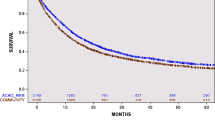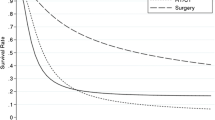Abstract
Background
Gallbladder cancer has a high mortality rate and an increasing incidence. The current National Comprehensive Cancer Network (NCCN) guidelines recommend resection for all T1b and higher-stage cancers. This study aimed to evaluate re-resection rates and the associated survival impact for patients with gallbladder cancer.
Methods
Patients with gallbladder adenocarcinoma who underwent resection were identified from the National Cancer Database (2004–2015). Re-resection was defined as definitive surgery within 180 days after the first operation. Propensity scores were created for the odds of a patient having a re-resection. Patients were matched 1:2. Survival analyses were performed using the Kaplan–Meier and Cox proportional hazard methods.
Results
The study identified 6175 patients, and 466 of these patients (7.6%) underwent re-resection. Re-resection was associated with younger median age (65 vs 72 years; p < 0.0001), private insurance (41.6% vs 27.1%; p < 0.0001), academic centers (50.4% vs 29.7%; p < 0.0001), and treatment location in the Northeast (22.8% vs 20.4%; p = 0.0011). Compared with no re-resection, re-resection was associated with pT stage (pT2: 47.6% vs 42.8%; p = 0.0139) and pN stage (pN1-2: 28.1% vs 20.7%; p < 0.0001), negative margins on final pathology (90.1% vs 72.6%; p < 0.0001), and receipt of chemotherapy (53.7% vs 35.8%; p < 0.0001). The patients who underwent re-resection demonstrated significantly longer overall survival (OS) than the patients who did not undergo re-resection (median OS, 44.0 vs 23.0 months; p < 0.0001). After propensity score-matching, re-resection remained associated with superior survival (median OS, 44.0 vs 31.0 months; p = 0.0004).
Conclusions
Re-resection for gallbladder cancer is associated with improved survival but remains underused, particularly for early-stage disease.






Similar content being viewed by others
References
Hundal R, Shaffer EA. Gallbladder cancer: epidemiology and outcome. Clin Epidemiol. 2014;6:99–109.
Wernberg JA, Lucarelli DD. Gallbladder cancer. Surg Clin North Am. 2014;94:343–60.
Sachs TE, Akintorin O, Tseng J. How should gallbladder cancer be managed? Adv Surg. 2018;52:89–100.
Misra S, et al. Carcinoma of the gallbladder. Lancet Oncol. 2003;4:167–76.
Diehl AK. Gallstone size and the risk of gallbladder cancer. JAMA. 1983;250:2323–6.
Kumar S, Kumar S, Kumar S. Infection as a risk factor for gallbladder cancer. J Surg Oncol. 2006;93:633–9.
Stephen AE, Berger DL. Carcinoma in the porcelain gallbladder: a relationship revisited. Surgery. 2001;129:699–703.
NCCN Clinical Guidelines in Oncology. Hepatobiliary Cancers. Retrieved 18 August 2020 at nccn.org.
Kasumova GG, et al. Surgical management of gallbladder cancer: simple versus extended cholecystectomy and the role of adjuvant therapy. Ann Surg. 2017;266:625–31.
Butte JM, et al. Residual disease predicts outcomes after definitive resection for incidental gallbladder cancer. J Am Coll Surg. 2014;219:416–29.
de Savornin Lohman EAJ, et al. Re-resection in incidental gallbladder cancer: survival and the incidence of residual disease. Ann Surg Oncol. 2020;27:1132–42.
Pawlik TM, et al. Incidence of finding residual disease for incidental gallbladder carcinoma: implications for re-resection. J Gastrointest Surg. 2007;11:1478–86; discussion 1486–7.
Shih SP, et al. Gallbladder cancer: the role of laparoscopy and radical resection. Ann Surg. 2007;245:893–901.
Dixon E, et al. An aggressive surgical approach leads to improved survival in patients with gallbladder cancer: a 12-year study at a North American center. Ann Surg. 2005;241:385–94.
Wang SJ, et al. Nomogram for predicting the benefit of adjuvant chemoradiotherapy for resected gallbladder cancer. J Clin Oncol. 2011;29:4627–32.
Ben-Josef E, et al. SWOG S0809: a phase II intergroup trial of adjuvant capecitabine and gemcitabine followed by radiotherapy and concurrent capecitabine in extrahepatic cholangiocarcinoma and gallbladder carcinoma. J Clin Oncol. 2015;33:2617–22.
National Cancer Database. Retrieved 21 August 2020 at https://www.facs.org/quality-programs/cancer/ncdb.
Bilimoria KY, et al. The National Cancer Data Base: a powerful initiative to improve cancer care in the United States. Ann Surg Oncol. 2008;15:683–90.
Classifications. International Classification of Diseases for Oncology, 3rd edition (ICD-O-3) 5 October 2015. Cited 21 August 2020.
van Walraven C, et al. Time-dependent bias was common in survival analyses published in leading clinical journals. J Clin Epidemiol. 2004;57:672–82.
Lewallen S, Courtright P. Epidemiology in practice: case-control studies. Community Eye Health. 1998;11:57–8.
SAS Institute Inc. SAS/STAT 14.2 User’s Guide. SAS Institute Inc., Cary, NC, 2016.
Shirai Y, et al. Early carcinoma of the gallbladder. Eur J Surg Acta Chirurg. 1992;158:545–8.
Wakai T, et al. Early gallbladder carcinoma does not warrant radical resection. Br J Surg. 2001;88:675–8.
Lundgren L, et al. Management of incidental gallbladder cancer in a national cohort. Br J Surg. 2019;106:1216–27.
Hari DM, et al. A 21-year analysis of stage I gallbladder carcinoma: is cholecystectomy alone adequate? HPB Oxford. 2013;15:40–8.
Abramson MA, et al. Radical resection for T1b gallbladder cancer: a decision analysis. HPB Oxford. 2009;11:656–63.
Benson AB III, et al. NCCN clinical practice guidelines in oncology: hepatobiliary cancers. J Natl Compr Cancer Netw. 2009;7:350–91.
Vo E, et al. National failure of surgical staging for T1b gallbladder cancer. Ann Surg Oncol. 2019;26:604–10.
Jensen EH, et al. A critical analysis of the surgical management of early-stage gallbladder cancer in the United States. J Gastrointest Surg. 2009;13:722–7.
Author information
Authors and Affiliations
Corresponding author
Ethics declarations
Disclosure
There are no conflict of interest.
Additional information
Publisher's Note
Springer Nature remains neutral with regard to jurisdictional claims in published maps and institutional affiliations.
Rights and permissions
About this article
Cite this article
Papageorge, M.V., de Geus, S.W.L., Woods, A.P. et al. Undertreatment of Gallbladder Cancer: A Nationwide Analysis. Ann Surg Oncol 28, 2949–2957 (2021). https://doi.org/10.1245/s10434-021-09607-6
Received:
Accepted:
Published:
Issue Date:
DOI: https://doi.org/10.1245/s10434-021-09607-6




